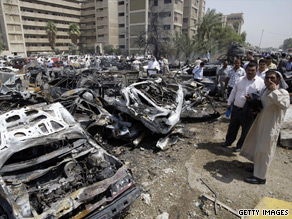
Bombs in Baghdad
Today was the deadliest day in Baghdad since America left the city earlier this year; tomorrow is the most important day in the city since America left.


Subscribe to:
Post Comments (Atom)
But we'll sure as hell talk about it anyways...

The way Iraq responds to today's bombing will determine Iraq's position w/in the international community for years to come. If, as a democracy, they follow standard international processes for investigating the bombings, they'll accomplish two things:
ReplyDelete1) By showing the world that they can, and will, deliver justice through the judicial system (opposed to a strictly military response), they'll begin to earn the trust of the international community; ultimately, this trust will open many more doors than America could ever provide as their sole ally.
2) By showing the terrorists that they will not sink to their level, they'll be proving that terrorism will not be successful in its quest to destroy democracy in Iraq; this lack of success will deter future terrorist attacks, ultimately leading to whatever the opposite of the "death spiral" is - the "life cycle" perhaps?
So what was the consensus on Iraq's response? Should we be encouraged or discouraged?
ReplyDeleteI haven't seen anything related to this since the initial articles on Wednesday; have you seen anything?
ReplyDeleteI'm not sure if no news is good news, but my gut says the initial response should be encouraging. If they'd responded with military response, I'm sure we'd have seen something. I would love to be able to hear the conversations between Iraq and American right now - one can only guess how much the Obama administration is begging for a non-violent response.
However, I think we're still early in the game here; elections will happen sometime in January I believe, so until then, I'm sure the terrorists will provide the government with a number of tests. Here's to hoping Iraq and the world at large are ready to respond responsibly.
This Economist article does a good job, in my opinion, of describing what has taken place, politically, in Iraq since the bombings last week. Outside of the clusterfuck world that is Iraq right now, this sounds very similar to any type of political battle we'd find here in America. The final sentence sums it up nicely: "But for the moment, all is in flux."
ReplyDeleteI'm a bit worried by all the sectarian politics references, as I'd hope someone would "show leadership" and ditch it entirely to try and lead Iraq away from terrorism and America. However, even the naivete in me finds it hard to be too hopeful at this moment in time.
That's a great article, and it does sound strikingly similar to politics here. I found this passage particularly telling:
ReplyDelete"The Shia elders had never liked or trusted [current President Maliki]. They heaved him into office in 2006 simply because they could not agree on championing one of their own. They hoped for a malleable weakling; instead they got a bold but impulsive leader."
I like hearing that they accidentally found a leader who wants to lead. Although like all politicians, his proclivity to take credit for all successes rings hollow.
Maliki's reaction to being ousted after the bombings was also interesting. If he really plans "to set up a multi-confessional coalition" and, "After alienating Kurds and Sunnis for the past three years, he is now trying to charm them," then that's really interesting. It could lead to the unified voice for Iraq you are hoping for Scott.
The article says it's unlikely Maliki wins re-election, however.